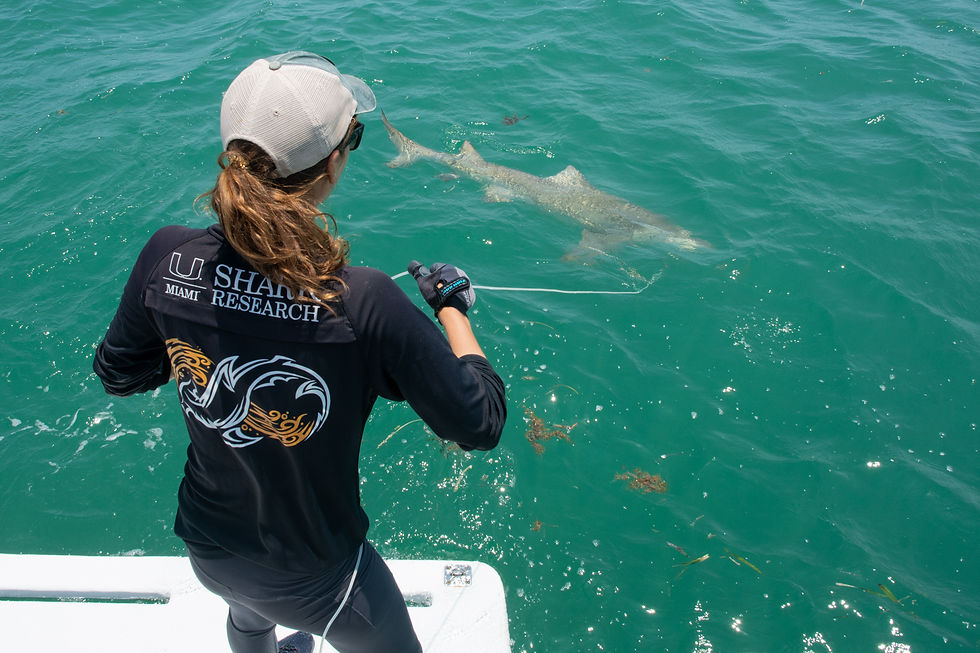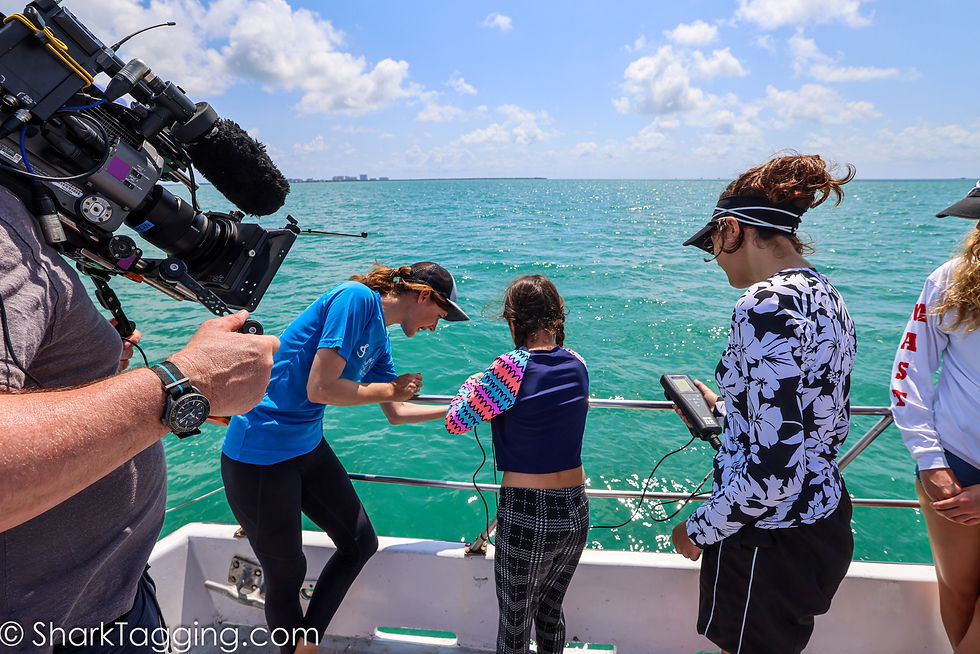Interview with Marine Conservation Biologist Dr. Catherine Macdonald
- Jillian Morris
- Jul 2, 2024
- 4 min read
Dr. Catherine Macdonald is an interdisciplinary marine conservation biologist who studies shark and ray biology, ecology and conservation. Her research interests also include marine ecosystems, human-wildlife conflict and wildlife tourism. She is a National Geographic Explorer, co-founder of Field School, an interdisciplinary marine science training and education organization, and the Director of the Shark Research and Conservation Program at the University of Miami’s Rosenstiel School for Marine, Atmospheric, and Earth Science.
Dr. Macdonald works to increase safe and welcoming field research opportunities for historically (and often currently) excluded groups in STEM, particularly scientists of color, women and LGBTQ+ scientists. She is a “Friend of MISS” (Minorities in Shark Science) and was the 2021 winner of the Student-Led Evaluations and Development Committee (SLED) Mentor of the Year award.
You can follow more of her work on Instagram: DR CAT MAC SHARKTAGGING

Catherine ready to release a juvenile ( and super cute) nurse shark after a scientific workup Credit Cliff Hawkins
1. What is your favorite shark and why?
It's very hard to choose just one favorite shark! But if I had to pick my favorite shark to work with, it would be great hammerhead sharks (especially the juveniles).I can't explain why they're my favorite—maybe it's the big eyes? The cephalofoil (hammer)? The huge dorsal fin? I'm not sure. I just know I'm always especially happy to see them. Though my whole team agrees that a day we see ANY shark is great.
2. If you could see/study/swim with any shark, what would it be and why?
I have never seen a thresher shark—I think it would be really neat to swim with one. Their tails are so impressive, it would be incredible to watch one hunt!
If I could study any shark, I'd like to get to research some of the deep sea shark species we know very little about. There's so much to learn about them, from their habitats and movement to diet and reproduction. For some species we don't know even the most basic information about their lives! But to answer the questions I'd want to, I would need some new tools—tags that could handle the pressures of the deep sea and send back data, and sampling strategies that could keep deep sea sharks safe and healthy on the way to the surface (and back down). Maybe some day! (You didn't say my wish had to be realistic...)

Catherine securing a tiger shark during a scientific workup Credit: Shark Research & Conservation Lab (SRC)
3. Can you tell us a little about your current research?
My lab studies topics in shark biology, ecology, and conservation. That includes a lot of different topics from habitat use (where sharks spend time) to diet and feeding, to their social behaviors and reproduction. Right now, I'm really excited about some of our research on parasites, symbiosis, and food webs! My team spends a lot of time out on the water fishing and collecting samples, but we also study sharks using drones, which our pilots use to study shark diversity and behavior in shallow habitats along the coast. I am especially interested in nursery habitats, places where some species give birth or live while they're young and small, and in understanding the ecological function and importance of what scientists call "highly human impacted" habitats—urban areas like the places around Miami where sharks and people coexist. Because I'm interested in shark conservation, I also research how humans relate to sharks and what people think about them.

Catherine brings in a shark to the boat for a scientific workup Credit: Shark Research & Conservation Lab (SRC)
4. What inspired you to study sharks?
When I was about eight years old, I came across a fisherman on the beach who had caught a bonnethead shark. I didn't really know anything about sharks, but I was a compassionate kid, and I felt so sorry for that little shark even as the adults there were worried that it might be dangerous to the kids who were swimming. Looking at it, it didn't seem ferocious or scary at all—I felt so sorry for it! And, of course, I was also curious about it. I wanted to know more, and that fascination and curiosity never went away. I'm still so excited every time we learn something new
5. What advice do you have for students interested in a career in marine science/shark science?
Don't think there's only one way to be the person you want to be, or to make the difference you want to make in the world. Maybe you're meant to be a scientist, but maybe you actually would rather be a teacher, or a boat captain, or an activist, or an artist who paints the ocean! Try a lot of different things that interest you out and see what you think about all of them. Imagining you're supposed to be just one thing in your life isn't healthy, and I'm grateful that my own career path was very winding—I did research in history, I traveled, I worked in bird rescue and on a dolphin boat, and all of those very different experiences shaped me and helped me become who I am today. I didn't start working with sharks until after college—there's a lot of time to find your way! You don't have to see your whole path now or know how everything fits together from the start, you just have to work hard, be curious, and explore. (Oh, and of course, be kind to yourselves and each other—success looks like building collaboration and making friends, not beating the competition).

Catherine teaching a student to set lines during a research day ( featured on CNN's The Whole Story Deep Dive: Shark Wars)

